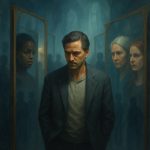
When “Likes” Become Leashes: How Approval Addiction Derails Alignment
April 16, 2025
From Heat to Hypocrisy: The Death and Rebirth of the Male Hero in the Age of Chaos
April 22, 2025Part I: The Quiet Panic of the Professor
There is a moment I keep coming back to—one I can’t seem to shake. It’s not dramatic. There’s no podium, no protest, no irate parent demanding a refund. Just a quiet hallway. Fluorescent lights hum overhead. My books are packed. My nameplate is gone. I sit one last time in an office that, for decades, had been my chapel.
No one knocks.
After thirty-four years of teaching English, Film Studies, and Shakespeare—after directing theatre companies, mentoring students, and watching the spark ignite behind their eyes—it ends not with a bang, but with silence. And maybe that’s fitting. Because the silence isn’t just mine. It’s the growing, aching quiet spreading across universities everywhere.
Something is dying. Slowly. Elegantly, even. Like a language falling out of use.
Part II: Anti-Intellectualism Ascendant
The truth is, America no longer trusts its thinkers. We’ve gone from revering professors to resenting them—from inviting intellectuals onto talk shows to branding them enemies of the common man.
Today, “critical thinking” is often read as code for ideological manipulation. Nuance is elitist. Expertise is suspect. And truth? That’s whatever your YouTube algorithm fed you at 2 a.m.
We are living in what philosopher Michael Lynch called an epistemological crisis: we no longer agree on what it means to know something. In this climate, intellectuals become dangerous not because they lie—but because they doubt. And doubt is intolerable in a world drunk on certainty.
Part III: The AI Tsunami
To make things more disorienting, the machines have arrived—and they’re better students than most of the humans I ever taught.
AI doesn’t get tired. It doesn’t skip office hours. It doesn’t push back on deadlines. It gives polished answers, offers instant feedback, and never asks why.
But something fundamental is lost when a young mind stops asking questions and starts generating responses.
Education was never just about content. It was about contact. A look across a desk. A pause in the middle of a lecture. A long, spiraling office conversation about Hamlet that turns into a life question about regret. These things don’t show up in syllabi. But they are the soul of the university. And the soul, I fear, is going unfunded.
Part IV: The Cult of Certainty
Here is the hardest truth: the world is increasingly allergic to people like me.
Intellectuals are inconvenient. We complicate. We warn. We resist dogma. We deal in ambiguity—that most hated of words in a society addicted to clarity.
But ambiguity is not confusion. It is wisdom with its sleeves rolled up.
Still, in a culture obsessed with branding, sound bites, and instant certainties, the intellectual becomes a threat. We don’t fit the narrative. And if you don’t fit the narrative, you are either a villain or a ghost.
Part V: What’s Left? What’s Next?
So what happens now? Where do we go when the academy becomes a mausoleum?
I think we scatter. We blog. We podcast. We meet in libraries and Discord servers and cluttered kitchens. We become public philosophers and rogue mentors. We say to the next generation: “Look, the old temples may be crumbling—but the fire is not out.”
For me, the pursuit of alignment is now my university. I teach through stories, essays, and whatever platforms remain that haven’t been swallowed by noise. I speak to those who still want to ask real questions—about cars, minds, mysticism, and meaning. I’m not wearing a robe anymore, but I’m still pointing at the stars.
And maybe, just maybe, there’s a new kind of university being born—not in buildings, but in connection. Not funded by tuition, but by trust.
We’re not done thinking. We’re just thinking elsewhere.